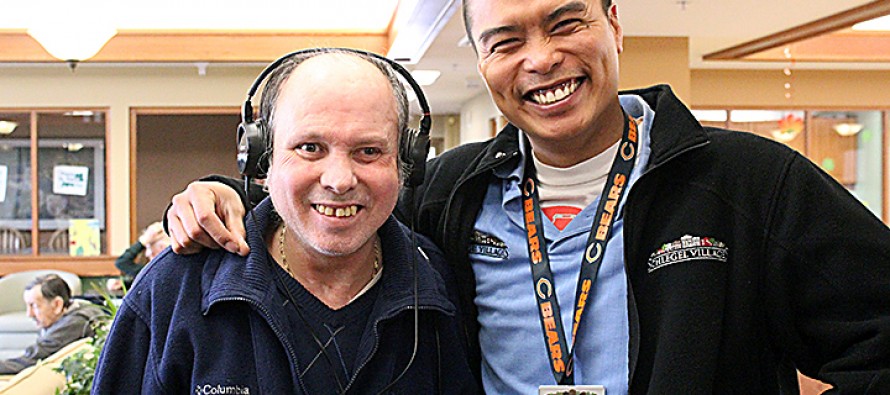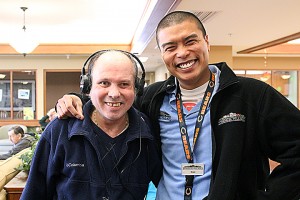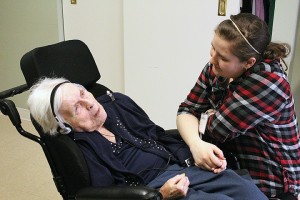Music and memory


JP Fortier (left) is a resident of St. Clair’s Schlegel Village, and has shown improvement since starting the Music and Memory Program. Photo by Lyndi-Colleen Morgan
By Lyndi-Colleen Morgan
Retirement homes and long-term care facilities in Windsor are using music therapy to help residents living with Alzheimer’s and dementia.
Several of these facilities are certified by the Music and Memory program, which helps patients remember and find connections in their lives through personalized music playlists.
Music and Memory is helping people who are living with a range of physical and mental challenges.
The program provides facilities with iPods and the tools needed to create music playlists. These playlists tap into the memories not affected by Alzheimer’s and dementia. It helps individuals to talk, socialize and be more like the person they were before they were affected by this disease.
More than 1,000 certified facilities across Canada and the United States which implemented Music and Memory. Some of them, like Schlegel Villages have made it a priority program.
“The Music and Memory program is one of Schlegel Villages signature programs,” said Hannah Renaud, the director of recreation at Schlegel Villages St. Clair. She has been there since it opened in 2014. “Team members (staff) throughout all of our villages have the availability to come and do the music and memory training.”
This enable the staff to complete an assessment properly when they meet with a resident and their families to discuss the music they enjoy.
St. Clair started its program eight months ago with 16 iPods and now have close to 56 being used by residents. Renaud said they are using it with all residents, not just those with Alzheimer’s and dementia.
She also said the first part of the brain to deteriorate is often verbal communication and memory. The part controlling music is a separate part of the brain so even after losing the ability to speak people are still able to listen and sing.
Playlists are created for each individual person using an assessment involving the resident themselves, their family and staff.
“What we try to do is to ask the neighbour [or their family] what kind of music they like and most often we will start with the wedding song. These are [songs] that bring back happy memories…that’s one of the key things we start from,” said Noel Erum, a full time recreation aid at St. Clair.
Both Renaud and Erum said they have watched patients who have not talked or have lost the ability to talk, sing to the music.

Sam Grant (right) is a social worker gerontology student at St. Clair College, and works with Fran Wood (left) who is a resident using the Music and Memory program. Photo by Lyndi-Colleen Morgan
Sam Grant is an intern from the St. Clair College gerontology social service worker program. She said she heard about the Music and Memory program in one of her classes at school and was excited to hear the placement she was working at had the program.
“One resident will sing and one of the first memories I have of them is [the song] ‘It’s A Long Way To Tipperary’ and every time they sang it they would say a different place. A couple weeks ago I asked ‘where is this place’ and they were able to make the connection they were in Windsor but they had traveled to all these places.”
Grant said every time the resident sang she would sing ‘it would be a long way from Windsor to’ and fill in the blank with another place she had visited.
“When they are listening to the music they are singing along, they are smiling, you can talk to them and it is just amazing to see their faces light up,” said Grant.
Erum said it not only provides the residents with comfort and a connection to something they have lost, but it provides the staff with another means of calming patients instead of relying on anti-psychotic medications.
“It makes your day so much better knowing that you are helping them out in one way,” said Erum. “It makes their lives easier and their families’ lives easier… it gives them a purpose.”
Renuad said although there isn’t a cure for Alzheimer’s and dementia, music therapy is the first step to finding a short term solution. For more information about the Music and Memory program can be found at www.musicandmemory.org.


